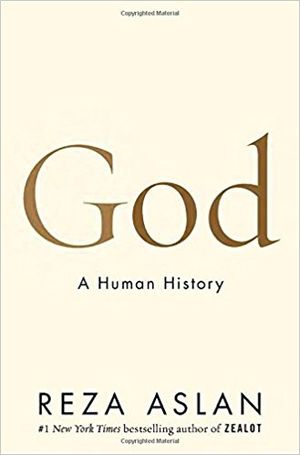
2020-9 God: A Human History (2017) by Reza Aslan
I listened to this book as an audio book in the car
I picked this book up because I vaguely remembered hearing about it on NPR. I am not religious, nor is my native country. Although I did have casual association with Catholicism (my mom was baptized when I was a teen – I grew up going to Sunday schools on semi-regular basis, just as a social activity), I always feel the need to understand the religious aspect of the Western world better in order to understand the music I practice on a deeper level. I take a critical position to concerts presented as rituals with oppressive hierarchy and protocols, and classical music as a pseudo-religious discipline with its canonized composers and repertoires, but I would not be doing the object of my criticism justice, if I did not strive to understand its cultural context.
Of course, I did not think I would understand the entirety of the evolution of the concept around God and religion from a single book and/or author. So, I was surprised/impressed to discover that that’s what the author attempted to do. I should have known that there would be some people who would be offended by the sheer attempt of such an endeavor.
In a very sharp-tongued review of the book published on The New York Times, Emma Green writes as follows. The review is well-written and has so many great points, I am compelled to quote some excerpts.
A word of advice to the religiously curious: Don’t trust any history of God that has only 171 pages of text. Reza Aslan’s new project, “God: A Human History,” is aimed at the analytically minded spiritual seeker, the type who hopes to answer deep questions on the divine with study data and tidbits about evolution. But instead of arming readers with interpretive tools and good questions, Aslan tells a highly selective, generalized tale with the goal of proving his own beliefs. … The idea of the book is fairly simple: Human spirituality can be explained in one cohesive, linear story about our universal desire to see ourselves in God. Aslan is skeptical of religion, which he sees as “little more than a ‘language’ made up of symbols and metaphors.” He’s more interested in “the ineffable experience of faith,” which for him is “too expansive to be defined by any one religious tradition.”
I’ve been reading a lot of book reviews. For every book I read, I read at least 5-10 reviews. This review by Emma Green was so revelation, yet so resonating, its power provoked my curiosity and I looked her up. I also appreciated her authority with which she criticized the author’s arrogance. I would not have been confident enough to call it myself, but she makes it easy to agree with him – yes, he is arrogant.
There is also a danger in what he attempts to do with this book. How can I not commit the same mistake he does – so well (the book is a New York Time’s bestseller) – with my own book about music as a healing agent? The history of music is arguably as complex and multilayered as the history of God. In fact, sometimes, it is difficult to separate the two.
My query continues.